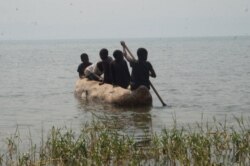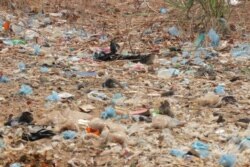Plastic bags continue to pollute Lake Malawi, despite a government ban on their use. Conservationists say the plastic is a threat to about 1,000 fish species found in the Africa's third-largest lake, and studies warn that the fish stock could be depleted by 2050 unless the lake is cleaned up.
"You know when these plastic papers go to the lake, you find that fish are eating these plastic papers which is harmful to fish," said Force Ngwira, country director for Ripple Africa, an environmental NGO in Malawi.
Malawi banned the use of thin plastics in 2012. However, the ban was suspended after the Plastic Manufacturers Association of Malawi obtained a court order negating it, saying the ban posed a danger to their businesses.
Although the Supreme Court of Appeal upheld the ban in July this year, communities living along Lake Malawi still complain of plastics flooding the lake.
"These plastic bags are heavily affecting lives of fish in the lake," said Time Mbewe, vice chairman for the Village Beach Committee responsible for taking care of lake resources in the Makawa area. "For example, we have a lot of fish around this area in the past, but now the plastic papers are making the fish fail to breathe properly."
Mbewe says residents cannot force manufacturers to stop producing plastic bags.
"We would wish government empowered us to sensitize traders who are selling the plastic papers to stop it," he said. "This would help us completely clean the lake of any plastic papers."
Ripple Africa has introduced an initiative that mobilizes communities to pick up the bags in and around the lake.
"We have done a lot of cleaning up campaign and we are also busy sending the message out that using the plastic paper in not a good thing," Ngwira said. "So we have already starting something on the ground."
Meanwhile, the government is running messages on local media, asking people to stop using plastic bags, and instead use carriers that can decompose more easily, like paper and canvas bags.











